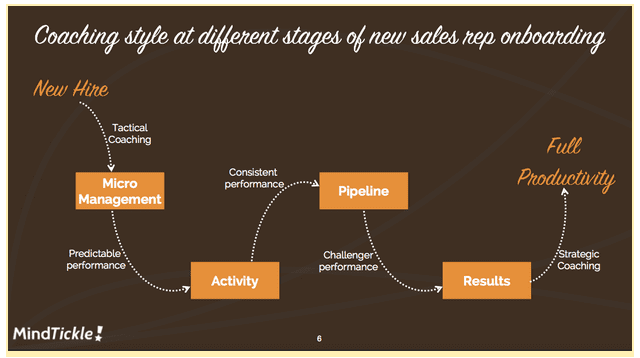 It’s nearly time for the bi-annual performance review performance again. As I pulled out data and started to fill out forms for each of my sales reps, I started to think about how much benefit this process provides to them and whether there’s a way to actually make the mid-year performance review process more relevant from a sales perspective.
It’s nearly time for the bi-annual performance review performance again. As I pulled out data and started to fill out forms for each of my sales reps, I started to think about how much benefit this process provides to them and whether there’s a way to actually make the mid-year performance review process more relevant from a sales perspective.
Turning to LinkedIn, I came across some interesting conversations on the way different managers approach reviews for their sales staff. The consensus seems to be that while a biannual review process may suit some business teams, it just isn’t adequate for sales managers. As David Collins Oliver observes, “The key is that if your sales manager is effective, they should be shadowing each salesperson periodically, doing quick one on ones, actively communicating with their team to truly understand the effectiveness of each salesperson. Thus, the one on ones should not be a major ordeal, unless of course the salesperson has not been performinng.
Edmund Chien agrees that more regular reviews are necessary for sales managers, “We conduct weekly mini-reviews. It’s much better to make small adjustments than going the wrong way for 6 or 12 months.”
In fact Brian Geery went as far as to say that you could almost do away with the biannual review process altogether:
“If your sales manager(s) are providing regular coaching and if you have monthly sales activity goals and annual sales quotas, there is no need for a mid-year review.”
However, others did offer some good thoughts on how to use the mid-year check-in to gather feedback and plan development opportunities. I really like this idea put forward by Craig Preston, “I think a great tool for mutual benefit is the 2-way review (allowing staff to also provide a review for management). This helps managers as well, and really aligns expectations of both salespeople and their managers.”
What appeared clear from my research is that coaching and reviews go hand in hand, and they should be part of the day-to-day management of a sales rep.
So How Often Should You Review Your Sales Reps?
There really are no hard and fast rules about how often you should review your sales reps, but it’s closely aligned to the level of coaching that they require. So it really depends on what stage of maturity they’re at as a sales rep. For example, your new hires will require a much higher touch than seasoned professionals who are operating at full productivity. There are four stages of development that we’ve identified that indicate the level of both coaching and periodic reviews. There are four stages of development that we’ve identified that indicate the level of both coaching and periodic reviews.

Micromanagement – When you’re just getting your newbie up and running they need more tactical coaching and micro-management. For these reps, you’re probably speaking to them every day, reviewing their numbers and seeing how they’re doing;
Activity – For new reps who are moving up their cycle of growth or your C Players, their performance may look predictable but it’s still not quite up to par. Their coaching needs are more activity based, focusing on specific skill gaps but they will still need you to watch over their performance closely. At this stage, you’re probably reviewing their performance a few times a week.
Pipeline – For consistent performers, your solid B Players, they’re ready to be more independent. Coaching should focus on helping them manage their pipeline. As they progress into this stage, they may only need you to review their performance once a week.
Results – The final stage of development is for those who are clear challengers, achieving results and performing at full productivity. These are your A Players and they’re independent performers. While you may not need to review them every week, it’s still important to check in regularly and work on areas of strategic coaching for fine-tuning and to keep them engaged.
While you prepare to tick the box for the mid-year review process, the reality is that this shouldn’t be the first time you talk to your reps about their quota or their development. Conducting regular reviews and structured coaching to plug gaps and develop each rep based on their individual needs will ensure there are no surprises at the end of the year. While HR may not allow you to do away with the mid-year performance review altogether, you can use this time to create a solid plan for developing your sales staff and a checkpoint to ensure that structured development and coaching plans are on track.
While HR may not allow you to do away with the mid-year performance review altogether, you can use this time to create a solid plan for developing your sales staff and a checkpoint to ensure that structured development and coaching plans are on track.



 By Rahul Mathew
By Rahul Mathew

